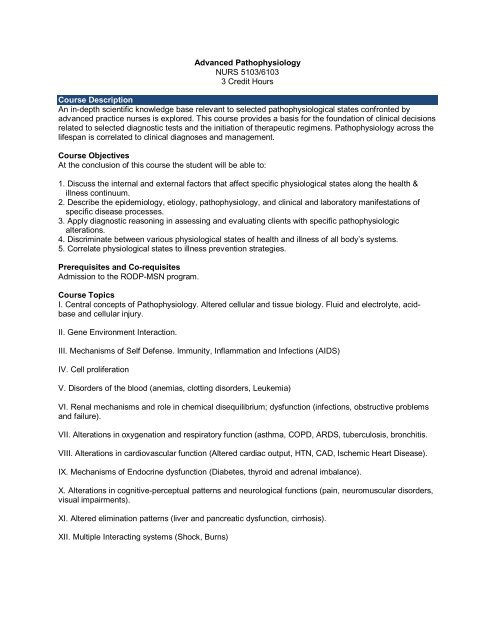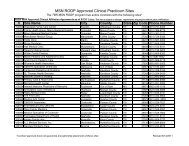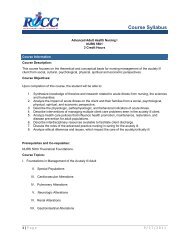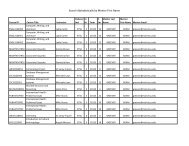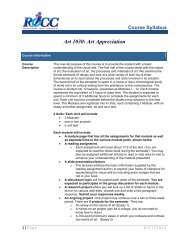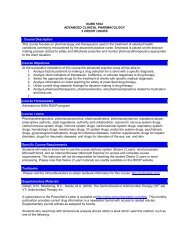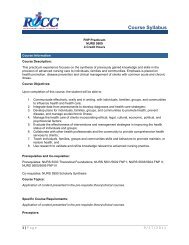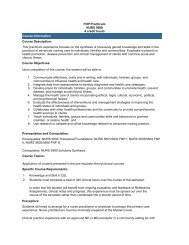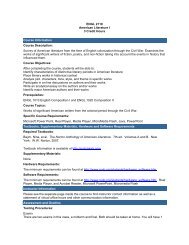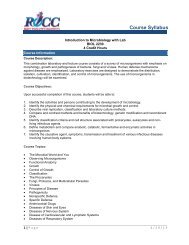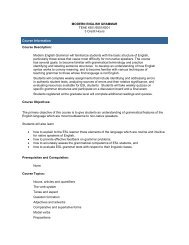Advanced Pathophysiology NURS 5103/6103 3 ... - Regents Online
Advanced Pathophysiology NURS 5103/6103 3 ... - Regents Online
Advanced Pathophysiology NURS 5103/6103 3 ... - Regents Online
Create successful ePaper yourself
Turn your PDF publications into a flip-book with our unique Google optimized e-Paper software.
<strong>Advanced</strong> <strong>Pathophysiology</strong><strong>NURS</strong> <strong>5103</strong>/<strong>6103</strong>3 Credit HoursCourse DescriptionAn in-depth scientific knowledge base relevant to selected pathophysiological states confronted byadvanced practice nurses is explored. This course provides a basis for the foundation of clinical decisionsrelated to selected diagnostic tests and the initiation of therapeutic regimens. <strong>Pathophysiology</strong> across thelifespan is correlated to clinical diagnoses and management.Course ObjectivesAt the conclusion of this course the student will be able to:1. Discuss the internal and external factors that affect specific physiological states along the health &illness continuum.2. Describe the epidemiology, etiology, pathophysiology, and clinical and laboratory manifestations ofspecific disease processes.3. Apply diagnostic reasoning in assessing and evaluating clients with specific pathophysiologicalterations.4. Discriminate between various physiological states of health and illness of all body’s systems.5. Correlate physiological states to illness prevention strategies.Prerequisites and Co-requisitesAdmission to the RODP-MSN program.Course TopicsI. Central concepts of <strong>Pathophysiology</strong>. Altered cellular and tissue biology. Fluid and electrolyte, acidbaseand cellular injury.II. Gene Environment Interaction.III. Mechanisms of Self Defense. Immunity, Inflammation and Infections (AIDS)IV. Cell proliferationV. Disorders of the blood (anemias, clotting disorders, Leukemia)VI. Renal mechanisms and role in chemical disequilibrium; dysfunction (infections, obstructive problemsand failure).VII. Alterations in oxygenation and respiratory function (asthma, COPD, ARDS, tuberculosis, bronchitis.VIII. Alterations in cardiovascular function (Altered cardiac output, HTN, CAD, Ischemic Heart Disease).IX. Mechanisms of Endocrine dysfunction (Diabetes, thyroid and adrenal imbalance).X. Alterations in cognitive-perceptual patterns and neurological functions (pain, neuromuscular disorders,visual impairments).XI. Altered elimination patterns (liver and pancreatic dysfunction, cirrhosis).XII. Multiple Interacting systems (Shock, Burns)
Required TextbooksPlease visit the Virtual Bookstore to obtain textbook information for this course: http://rodp.bkstr.comMcCance & Huether (2010). <strong>Pathophysiology</strong>: The biologic basis for disease in adults and children (6thedition). St. Louis: C. V. Mosby. ISBN 978-0-323-06584=9Supplemental TextsAssigned periodicals, documents, position statements, and Internet online articles.Supplementary MaterialsSupplemental periodicals and journal articles assigned by instructor.Hardware RequirementsThe minimum requirements can be found athttp://www.rodp.org/current-students/technical-supportSoftware RequirementsThe minimum requirements can be found athttp://www.rodp.org/current-students/technical-supportAdditional software requirements for this course include Microsoft Office (Word, PowerPoint), AcrobatReader, and supporting software for video-conferencing.Instructor InformationPlease see the separate page inside the course to find instructor contact information as well as astatement of virtual office hours and other communication information.Testing ProceduresAll course requirements are submitted online.Grading Procedure 10% Discussion Board (12case studies) Critical pa ths (2 ) Exam s (3) Quizzes (9)20%60%10%Grading ScaleA = 93-100 B = 85-92 C = 77-84 D = 70-76F =
Class ParticipationAll students are expected to actively participate in case study discussions. Each student will be assignedto lead one discussion topic. Each module contains a case study. Students are required to respond tocase study leader and discuss case study discussion questions. Student responses to discussionquestions must be substantive, that is, thoughtful and analytical. Because the D2L system has its ownway of formatting material posted on the discussion feature, the student will not be expected to strictlyfollow APA guidelines for online submissions. However, the student is held to academic standards ofwriting style and the use of proper grammar, punctuation and spelling.PunctualityStudents are expected to:• Check the course calendar for the due dates of assignments. (10 POINTS WILL BE DEDUCTEDPER DAY FOR LATE ASSIGNMENTS, no exceptions, unless prior or emergency approvalis given)• Check the course discussion board frequently for changes in course.Course Ground RulesThe student is expected to:1. Learn how to navigate in the D2L system.2. Participate by responding to all discussion questions.3. Keep abreast of course changes.4. Use the assigned college or university e-mail address as opposed to a personal e-mail address.5. Contact the instructor if unclear about assignment expectations.6. Address technical problems immediately.Guidelines for CommunicationsEmail:1. Always include a subject line.2. Remember without facial expressions some comments may be taken the wrong way.3. Be careful in wording your emails. Use of emoticons might be helpful in some cases.4. Use standard fonts.5. Do not send large attachments without permission.6. Special formatting such as centering, audio messages, tables, html, etc. should be avoided unlessnecessary to complete an assignment or other communication.7. Respect the privacy of other class members.Discussion Groups:1. Review the discussion threads thoroughly before entering the discussion.2. Try to maintain threads by using the "Reply" button rather starting a new topic.3. Do not make insulting or inflammatory statements to other members of the discussion group.4. Be respectful of others’ ideas.5. Be patient and read the comments of other group members thoroughly before entering your remarks.6. Be cooperative with group leaders in completing assigned tasks.7. Be positive and constructive in group discussions.8. Respond in a thoughtful and timely manner.Chat:1. Introduce yourself to the other learners in the chat session.2. Be polite. Choose your words carefully. Do not use derogatory statements.3. Be concise in responding to others in the chat session.4. Be prepared to open the chat session at the scheduled time.5. Be constructive in your comments and suggestions.
LibraryThe Tennessee Virtual Library is available to all students enrolled in the <strong>Regents</strong> <strong>Online</strong> Degree Program.Links to library materials (such as electronic journals, databases, interlibrary loans, digital reserves,dictionaries, encyclopedias, maps, and librarian support) and Internet resources needed by learners tocomplete online assignments and as background reading must be included in all courses.Students with DisabilitiesQualified students with disabilities will be provided reasonable and necessary academic accommodationsif determined eligible by the appropriate disability services staff at their home institution. Prior to grantingdisability accommodations in this course, the instructor must receive written verification of a student'seligibility for specific accommodations from the disability services staff at the home institution. It is thestudent's responsibility to initiate contact with his/her home institution's disability services staff and tofollow the established procedures for having the accommodation notice sent to the instructor.Syllabus ChangesThe instructor reserves the right to make changes as necessary to this syllabus. If changes arenecessitated during the term of the course, the instructor will immediately notify students of such changesboth by individual email communication and posting both notification and nature of change(s) on thecourse bulletin board.Technical SupportIf you are having problems logging into the course, timing out of the course, using the course web sitetools, or other technical problems, please visit the AskRODP Customer Support web page athttp://askrodp.custhelp.com/ or call the AskRODP Help Desk at 1-866-550-RODP (1-866-550-7637)Honor CodeAny form of academic dishonesty is a serious offense in an academic Community. It is essential thatevery student understands the standards of academic honesty and how to avoid dishonesty by properacknowledgment of intellectual indebtedness.The instructor will not excuse a lack of awareness or understanding of what constitutes academicdishonesty. Any attempt to commit any of the following infractions also constitutes academic dishonesty.Academic dishonesty includes but is not limited to:Plagiarism: Failure to acknowledge ideas, phrases, data, music, or images used in any paper, exercise orproject submitted in a course but gained from another person. Misrepresentation or falsification of data inany coursework. Self-plagiarism: the submission of one piece of work in more than one course withoutthe written permission of the instructors involved. Cooperative or collaborative effort in coursework withoutacknowledgment. Assume that acknowledgement is necessary any time you collaborate and/orcooperate, unless you are expressly informed that it is not. This is not meant to inhibit discussion anddebate of academic subjects either inside or outside the classroom. Cooperative or collaborative effort incoursework without the explicit permission of the instructor. Assume collaboration and/or cooperation arenot permitted unless you are expressly informed that they are. This is not meant to inhibit discussion anddebate of academic subjects either inside or outside the classroom.Cheating on examinations or tests: to give or receive assistance from written material, another person, hisor her paper, or any other source, or to attempt to do so, during an examination or test. The submission ofwork as one's own that has been prepared by another person.Stealing, altering, redirecting, or otherwise tampering with the form or content of digital media created orpresented by another person without explicit permission of that person.Forgery or falsification of academic documents is a form heating


